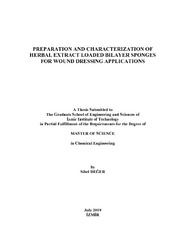Please use this identifier to cite or link to this item:
https://hdl.handle.net/11147/7330Full metadata record
| DC Field | Value | Language |
|---|---|---|
| dc.contributor.advisor | Tıhmınlıoğlu, Funda | - |
| dc.contributor.author | Değer, Sibel | - |
| dc.date.accessioned | 2019-11-05T06:57:56Z | - |
| dc.date.available | 2019-11-05T06:57:56Z | - |
| dc.date.issued | 2019-07 | - |
| dc.identifier.citation | Değer, S. (2019). Preparation and characterization of herbal extract loaded bilayer sponges for wound dressing applications. Unpublished master's thesis, İzmir Institute of Technology, İzmir, Turkey | en_US |
| dc.identifier.uri | https://hdl.handle.net/11147/7330 | - |
| dc.description | Thesis (Master)--Izmir Institute of Technology, Chemical Engineering, Izmir, 2019 | en_US |
| dc.description | Full text release delayed at author's request until 2020.03.12 | en_US |
| dc.description | Includes bibliographical references (leaves: 71-82) | en_US |
| dc.description | Text in English; Abstract: Turkish and English | en_US |
| dc.description.abstract | Recently, the use of biomaterials with natural extracts have been rapidly increasing as an alternative to antibiotic-loaded biomaterials in wound healing applications. Cissus quadrangularis (CQ) is a natural extract which has antiinflammatory, anti-bacterial and anti-fungal activities. CQ has been used as a natural therapy in India to treat many problems such as bone repair, skin infection and wound. In this thesis study, it was aimed to prepare and characterize a bilayer wound dressing consisting of CQ extract that can mimic skin structure and to investigate extract release from the wound dressing. CQ loaded chitosan nanofibers were coated on the chitosan/POSS composite sponges with the electrospinning method as a bilayer wound dressing to treat exudate wounds. The morphology and encapsulation efficiency of the extract-loaded chitosan nanofibers are optimized to achieve controlled release of the extract. Morphologies of nanofibers were observed by scanning electron microscopy (SEM) analysis. Bilayer sponges were characterized by FT-IR, swelling, porosity, mechanical properties, antimicrobial activity, and cytotoxicity analyzes. The diameters of the nanofibers were found between 77.9±4 nm and 97.4±4 nm. The water vapor permeability of the wound dressings is between 4021 and 4609 g/m2day which is found in the appropriate range for wound healing. Bilayer dressings reached 78% to 80% cumulative release at the end of fourth day and release medium showed antimicrobial activity against E. coli and S. epidermidis. Wound dressings have not shown any toxic effects on the 3T3 cell line. Consequently, the extract loaded bilayer sponges are found as potential candidates for wound dressing. | en_US |
| dc.description.abstract | Son zamanlarda, yara iyileşme uygulamalarında, doğal özlü biyomalzemelerin kullanımı antibiyotik yüklü biyomalzemelere alternatif olarak hızla artmaktadır. Cissus quadrangularis (CQ), anti-enflamatuar, anti-bakteriyel ve anti-fungal aktiviteleri olan doğal bir ekstraktır. CQ, Hindistan'da kemik onarımı, cilt enfeksiyonu ve yara gibi birçok sorunu tedavi etmek için doğal bir terapi olarak kullanılmaktadır. Bu çalışmada, cilt yapısını taklit edebilen CQ ekstraktından oluşan iki tabakalı bir yara örtüsünün hazırlanması ve karakterize edilmesi ve yara örtüsünden ekstrakt salınımının araştırılması amaçlandı. CQ yüklü kitosan nano lifleri, eksuda yaralarını tedavi etmek için iki tabakalı yara sargısı olarak elektroeğirme yöntemi ile kitosan/POSS kompozit süngerlerin üzerine kaplandı. Ekstrakt yüklü kitosan nano liflerinin morfolojisi ve enkapsülasyon verimliliği, ekstraktın kontrollü salımını sağlamak için optimize edilmiştir. Taramalı elektron mikroskobu (SEM) analizi ile nano liflerin morfolojileri gözlendi. İki katmanlı süngerler, FT-IR, şişme, gözeneklilik, mekanik özellikler, antimikrobiyal aktivite ve sitotoksisite analizleri ile karakterize edildi. Nano liflerin çapları 77.9 ± 4 nm ile 97.4 ± 4 nm arasında bulundu. Yara örtücülerin su buharı geçirgenliği 4021 ve 4609 g/m2gün aralığındadır ve bu değerler yara iyileşmesi için uygun bulunmuştur. İki tabakalı örtücüler dördüncü günün sonunda kümülatif ekstrakt salımı % 78 ile % 80'e ulaştı ve salım ortamı E. coli ve S. epidermidis'e karşı antimikrobiyal aktivite gösterdi. Yara pansumanları, 3T3 hücre çizgisi üzerinde herhangi bir toksik etki göstermemiştir. Sonuç olarak, ekstrakt yüklü iki katmanlı süngerler potansiyel yara örtüsü olmaya adaydır. | en_US |
| dc.format.extent | xi, 82 leaves | - |
| dc.language.iso | en | en_US |
| dc.publisher | Izmir Institute of Technology | en_US |
| dc.rights | info:eu-repo/semantics/openAccess | en_US |
| dc.subject | Cissus quadrangularis | en_US |
| dc.subject | Wound dressing | en_US |
| dc.subject | Bilayer sponges | en_US |
| dc.subject | Wound treatment | en_US |
| dc.title | Preparation and Characterization of Herbal Extract Loaded Bilayer Sponges for Wound Dressing Applications | en_US |
| dc.title.alternative | Yara Örtüsü Uygulamalarında Kullanılmak Üzere Doğal Ekstrakt Yüklü Çift Tabaka Süngerlerin Hazırlanması ve Karakterizasyonu | en_US |
| dc.type | Master Thesis | en_US |
| dc.institutionauthor | Değer, Sibel | - |
| dc.department | Thesis (Master)--İzmir Institute of Technology, Chemical Engineering | en_US |
| dc.relation.publicationcategory | Tez | en_US |
| dc.identifier.wosquality | N/A | - |
| dc.identifier.scopusquality | N/A | - |
| item.openairecristype | http://purl.org/coar/resource_type/c_18cf | - |
| item.languageiso639-1 | en | - |
| item.openairetype | Master Thesis | - |
| item.grantfulltext | open | - |
| item.fulltext | With Fulltext | - |
| item.cerifentitytype | Publications | - |
| Appears in Collections: | Master Degree / Yüksek Lisans Tezleri | |
Files in This Item:
| File | Description | Size | Format | |
|---|---|---|---|---|
| 10135959.pdf | MasterThesis | 12.18 MB | Adobe PDF |  View/Open |
CORE Recommender
Page view(s)
436
checked on Mar 31, 2025
Download(s)
1,488
checked on Mar 31, 2025
Google ScholarTM
Check
Items in GCRIS Repository are protected by copyright, with all rights reserved, unless otherwise indicated.